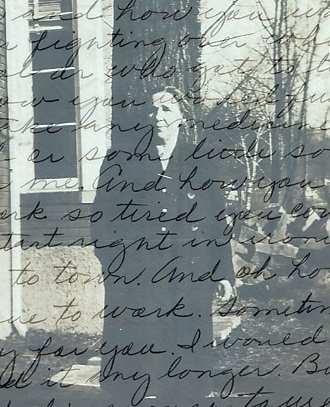When the U.S. entered World War II, Charles Henry Duff of Jackson, Kentucky had already been in the Army for 17 months. A few days after the attack on Pearl Harbor, he accompanied his infantry unit to Hawaii to begin 3½ years of active duty in the Pacific theatre. He would earn a Combat Infantryman Badge for exemplary conduct on Saipan. Though wounded, Duff came away with a Japanese pistol and saber as souvenirs of the battle.
But the day after Mother’s Day in 1943, he was just another soldier happy to receive a letter from his mother, Linnie Duff. Worried that she was worried after having received no recent letters from him, Charles made up for it with a heartfelt reply that paid tribute to his mother’s hard work and sacrifices throughout his life.
“Thinking of the times when I used to sit in the kitchen,” wrote the grateful son, “and watch you cook dinner and how you would scold us kids for fighting over who got to sit on the stool or who got to lick the cake pan. . . And how you used to come home from work so tired you could hardly walk. And start right in ironing a shirt for me to wear to town. And oh how it hurt me to see you have to work.” He recalled the guilt he experienced when, as a young man, he couldn’t contribute financially to their Depression-era Breathitt County household. “I couldn’t even get a job big enough to wear decent clothes, much less take care of a family. Who wanted to hire a little ole boy seventeen years old and not big enough for a boy of twelve.”
Charles remembered the “fuss” his mother made when he wouldn’t take medicine, or how she “used to lay awake nights waiting” for him to come home. “But the one thing that stands out more than anything,” he wrote, “is the way you would sing. When you were washing, ironing, cooking or anything that had to do with work you always did it with a song.”
Attributing his own passion for music to his mother, Charles made one request. “Music to me is everything. It’s life, love and even death. So never stop singing mother, no matter what happens.” And if he didn’t make it home from the war, she shouldn’t cry over him. “Just sing for me instead like you have always sung.” In the meantime, he told her never to doubt that he was thinking of her, because to this son “every day is Mother’s day.”
Charles Duff’s letter to his mother is part of the Manuscripts & Folklife Archives of WKU’s Department of Library Special Collections. Click here to access a finding aid. For more collections, search TopSCHOLAR and KenCat.

